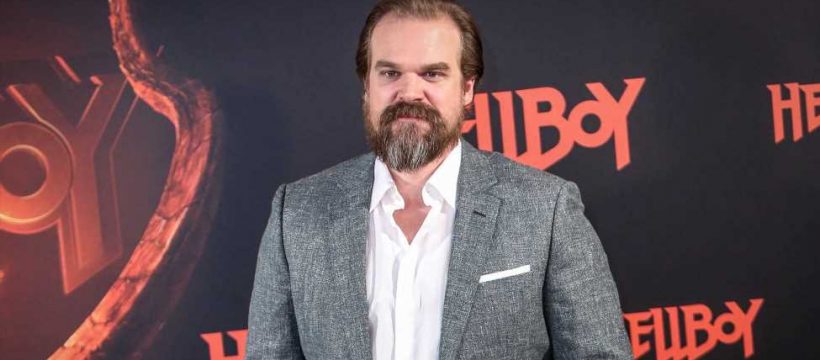In the aftermath of the recent mass shootings in Dayton, El Paso, and Gilroy, mental illness has once again become a central issue in the national conversation about gun violence. Actor David Harbour, who has spoken about his own struggle with mental illness in the past, took to Twitter to share his thoughts about how news outlets often fail to cover the issue with the proper context and nuance.
“The ‘mentally ill’ (this arbitrary societally agreed upon cattle brand to differentiate ‘us’ from ‘them’ re: pain) are overwhelmingly SUBJECT to violence, not perpetrators,” Harbour wrote in the first part of his four-Tweet thread. “I am a card carrying member and those I’ve met in asylums are some of the kindest, lost people I’ve known.”
Harbour shared his lack of patience with the way that “rage, hatred and deep uncertainty” tends to wind up focusing on a “weak, already ashamed and outcast group.” That the discourse consistently devolves to target those living with mental illness is “at best cowardly, and at worst calculated evil,” the Stranger Things star said.
It’s not the first time that Harbour has disclosed his own history with mental illness. In an interview on Marc Maron’s WTF podcast last year, he talked about getting diagnosed with bipolar disorder at age 25. Having gotten sober, Harbour was having a manic episode, and was admitted to an asylum. “I really had like, a bit of a break where I thought I was in connection to some sort of God that I wasn’t really in connection to,” he said, thinking back about his initial manic episode. “It was like I had all the answers suddenly.”
The 44-year-old actor had been working in the entertainment industry for decades when he had his big break: getting cast as Chief Hopper on Stranger Things in 2016. Hopper is the textbook definition of the masculine, ’80s-throwback action star. In the third season, Dustin tells Hopper “We’ll leave the hero stuff to you,” and that—for the most part—is exactly what he does in the show: punching bad guys in the face, sneaking into places he’s not supposed to be, and protecting Eleven at all costs. When he’s not doing action-hero stuff, he’s brooding, puffing on a cigarette, or cracking a one-liner (and sometimes doing all three simultaneously).
Netflix
Beyond his star turn in Stranger Things, Harbour also got extremely buff to play Hellboy in this year’s reboot of the franchise. All or this is to say that Harbour has distinguished himself as an actor by taking on roles that require him to portray complex manly-men.
This is why it’s so significant that Harbour decided to use his platform to speak out now and about the issue of mental illness. It’s not a secret that all three of the recent mass shooters—and the overwhelming majority of all mass shooters—are men. The problem, overwhelmingly, seems not to be one with mental illness, as Harbour suggested, but instead with toxic masculinity. And as Harbour points out, our rush to ostracize and demonize those living with mental illnesses woefully ignores the silent mental health crisis—which is literally killing men—that men currently face.
For someone like Harbour to speak out in such a vulnerable, open, and reasoned way—and to back it up with his own personal experiences—is an enormous step forward in the conversation surrounding mental health and gun violence.
Harbour’s already large platform is going to get even bigger. Not only is he an essential member of the Stranger Things ensemble, but next year he’ll join the Marvel Cinematic Universe alongside Scarlett Johansson in Black Widow. As a pivotal player in several major franchises, and with over a million followers on Twitter, Harbour choosing to lend his voice to this issue is a valiant and invaluable contribution to a discourse that desperately needs to be improved upon in America.
Check out the full Twitter thread below:
The ‘mentally ill’ (this arbitrary societally agreed upon cattle brand to differentiate ‘us’ from ‘them’ re: pain) are overwhelmingly SUBJECT to violence, not perpetrators. I am a card carrying member and those I’ve met in asylums are some of the kindest, lost people I’ve known.
More often it is the societally sanctioned sane that are violent. Being lost and confused and cracking up amidst the overwhelming hypocrisy and apathy of a society who’s very earth crumbles and decays by their own indifference seems to me a very considered response to daily life.
I tire of this archaic branding of a subset of the species altogether (who does not suffer), but certainly in times of cultural strife to focus rage, hatred and deep uncertainty on a weak, already ashamed and outcast group seems, at best cowardly, and at worst calculated evil.
It is an ‘ism’ like all others. ‘Sanism.’ And most days I deal with it with a certain duck-back-like-grace. But when you brand us the cause of societal ills, I bristle. And I think of where the ‘sane’ have gotten us. And where the ‘sane’ continue to lead us.
Source: Read Full Article

